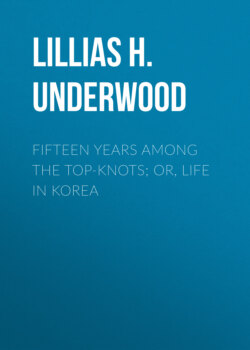Читать книгу Fifteen Years Among the Top-Knots; Or, Life in Korea - Lillias H. Underwood - Страница 8
На сайте Литреса книга снята с продажи.
ОглавлениеA STREET CROWD. PAGE 35
Of course, I walked as much as possible, but many weary miles must be endured in the chair, with its tiresome jogging, interrupted regularly with an upward jolt of several inches. The ordinary road soon came to be quite tolerable, but when the bearers in the half light of early dawn (or worse still, the evening, when tired with a long day’s march) picked their way over the narrow foot-paths, slippery with clay, between half-submerged rice fields, or jumped across intervening ditches, the rear man going wholly by faith, I must say it was not easy or pleasant.
We had quite a little train. Mr. Underwood was on his horse, with a mapoo to lead and care for it. These horses are all fed on a hot food of beans and chopped hay, and very carefully attended to. We had two or three pack-ponies which carried medicines, tracts, at that time mostly Chinese, which only scholars could read, our blankets and bedding, a few cooking utensils, and foreign food and our clothing. The question of money and changes of horses was a difficult one, but it had been solved by an order from the Korean Foreign Office, to the country magistrates, to accept our receipt for any amount of money that we might need, and also for horses in exchange for ours, all of which bills we were to pay in Seoul on our return. The money was so extremely bulky, it was impossible to take more than a couple of days’ supply on our ponies. On previous trips Mr. Underwood had carried large lumps of silver, which were exchanged in the towns for cash.
The little inns along the road never charge for rooms; the number of tables of rice and the number of horses fed are usually the only items in the landlord’s bill. In addition to chair coolies and mapoos, we had a young Christian helper, a cook, and a kesu. The two latter left us at Pyeng Yang and returned home.
